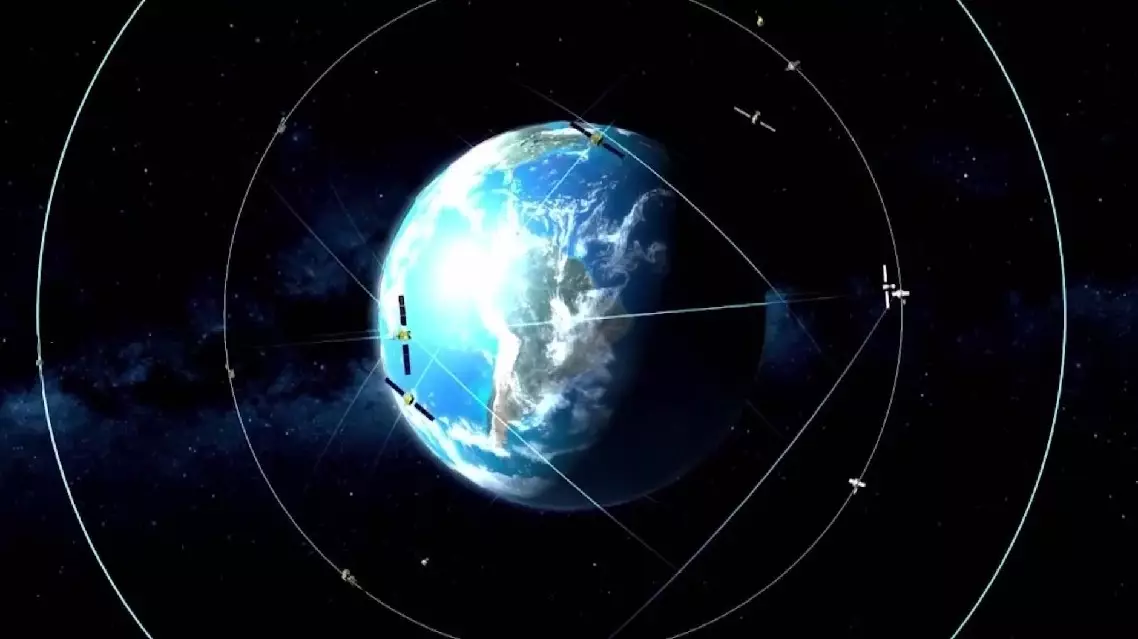China's BeiDou Navigation Satellite System (BDS), now providing global coverage, is operating smoothly and has seen rapid growth in its applications across a range of industries.
As China's independently developed satellite navigation system, BDS is one of the four global systems recognized by the United Nations.
Its development began with early proposals in the 1980s, leading to the official approval of the BDS-1 project in 1994. The past three decades have seen BDS evolved through a carefully phased strategy.
The system has progressed through three major stages. BDS-1 was completed in 2000, providing services within China.
Construction of BDS-2 began in 2004 and was completed in 2012, extending the system's coverage to the Asia-Pacific region.
Development of BDS-3, which began even before BDS-2 started providing regional services, was completed by 2020, enabling global coverage.
"Currently, BDS operates with stability and reliability, delivering outstanding performance. This ensures a solid foundation for large-scale applications, industrial development and global services," said Liu Dake, executive vice president of the Global Navigation Satellite System (GNSS) and Location Based Services (LBS) Association of China (GLAC), a non-profit association specializing in the GNSS and LBS industry.
The outstanding performance of the BDS comes from its unique hybrid constellation, which includes medium earth orbit (MEO), inclined geosynchronous orbit (IGSO) and GEO satellites.
Satellites in different orbits, 21,000 and 36,000 kilometers from Earth, work together to provide continuous, high-precision positioning, navigation and timing services to users worldwide.
In recent years, the BDS-related industry in China has experienced rapid expansion. In 2023, the total output value of China's satellite navigation and positioning service industry reached 536.2 billion yuan (about 75.9 billion U.S. dollars), up 7.09 percent from the previous year.
"The scale of BDS applications is continually expanding, and the industry is now entering a new phase of large-scale application and high-quality development. With deeper integration of BDS with technologies such as 5G, cloud computing, big data and artificial intelligence, we anticipate new digital applications and innovative products and business models to emerge," said Yu Xiancheng, president of GLAC.

China’s BDS sees smooth operation, thriving applications
Macao has been emerging as a global hub for conventions and exhibitions in recent years by exploring the enormous opportunities in the sector, driving the region to advance its economic diversification and embrace a brighter future.
Macao has received many awards this year, such as the Best Convention City (Asia) and the Best BT-MICE City, showcasing the recognition for and influence of Macao's exhibition industry.
More than 1,000 electronic game enthusiasts from all over the world gathered recently in Macao to participate in a esports themed event.
Su Zhili, organizer of the event, said that Macao's rich experience in hosting large-scale events, coupled with its good infrastructure, has driven him to choose the region as an ideal destination to hold such an activity.
"Macao has held many similar large-scale events. It has rich experience, and the facilities at the venue are relatively mature, so we can start our work comfortably," said Su.
During the first three quarters of 2024, Macao held more than 1,000 conferences and exhibitions in total.
"We will invite more professional, special conferences to be held in Macao and also cultivate more exhibition brands with international influence in Macao, so as to promote Macao's exhibitions to be more market-oriented, professional, international, digital and greener from various aspects. This is our goal," said Elaine Wong, member of the Macao Commerce and Investment Promotion Institute.
In addition, multiple large exhibitions and conferences, such as the Macao International Trade and Investment fair, the Macao Franchise Expo, and the International Infrastructure Investment and Construction Forum, are held regularly in Macao.
With the introduction of a series of policies and measures to facilitate the exchanges between the mainland and Macao, as well as the construction and development of the Guangdong-Hong Kong-Macao Greater Bay Area and the Guangdong-Macao In-Depth Cooperation Zone in Hengqin, Macao's convention and exhibition industry will embrace more opportunities for development in the foreseeable future.
"We have such a good industrial base in the Greater Bay Area. The mode of 'Convention and Exhibition + Industry' not only integrates the industries of Macao, but also the industries of the Greater Bay Area. In addition, Macao actively integrates into the national development and plays a role in the Belt and Road. Why are we so confident in Macao's convention and exhibition sector? Because it is backed by the motherland, and the country gives Macao great support," said Alan Ho, chairman of the Macao Association of Convention, Exhibition and Tourism Sectors.

Macao emerges as global hub for conventions and exhibitions, driving economic diversification and international recognition










